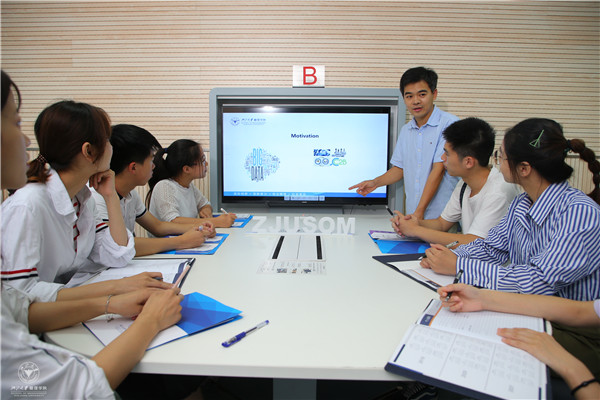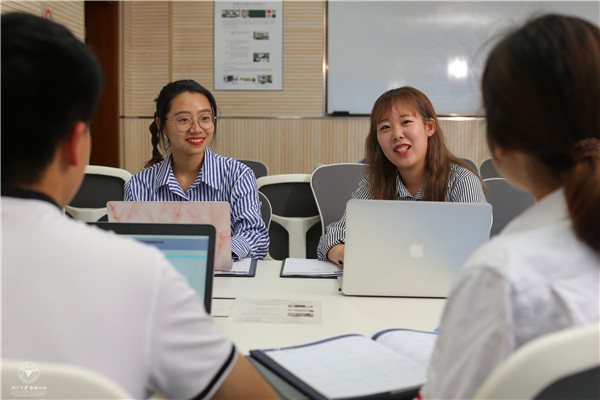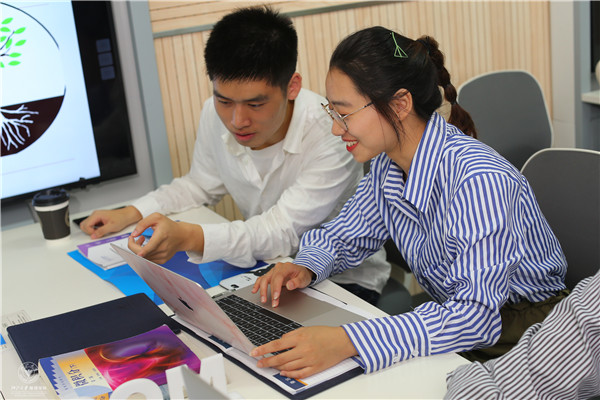"Business + Technology", "Business + Humanities", "Business + Mathematics", "Business + Arts" …… Not long ago, when the first batch of students enrolled in ZJU-SOM after its undergraduate education reform, what welcomed them was no longer traditional majors, but the "Business Plus" talent cultivation ecosystem which slims traditional majors, expands learning fields and strengthens faculty resources.

In September 2017, ZJU-SOM launched undergraduate education reform, aiming to optimize talent cultivation mechanism, and to accurately allocate resources to faculty, disciplines, courses and innovation practices. In August 2018, the original eight majors were optimized into three including Business Administration, Accounting, and Information Management and Information System.
"The future is coming". WEI Jiang, Dean of ZJU-SOM, described the original purpose of establishing "Business Plus" ecosystem and carrying out undergraduate education reform in one sentence explicitly.
Keep up with the time and build the "Business Plus" talent cultivation ecosystem
It's not exaggerated to say that education reform affects the entire system. As a pioneer and pathfinder in undergraduate education reform in Zhejiang University and even among universities across the country, ZJU-SOM has taken the construction of "Business Plus" talent cultivation ecosystem as a breakthrough of a series of reform.
"At present, there is a high demand for interdisciplinary talents and their all-round development. The social demand for talents calls for a break of disciplinary boundary." expressed by WEI Jiang. The concept of specialty was established in the great industrial and post-industrial era, when the high degree of labor division and standardized production required talents to be specialized in a certain field. However, with the development of Internet, big data and open ecology, needs of industries and trades are becoming more and more complex, so that specialty boundaries are no longer applicable."
In addition to the huge changes in social needs, the self-positioning of Zhejiang University has also promoted ZJU-SOM to seek innovation and change in its education reform. "Being in Zhejiang University, one of the best universities in China, the goal of ZJU-SOM is to cultivate senior management talents and leaders, capable of changing China and the world," WEI Jiang said.

In order to cultivate such talents, an all-round cultivation mechanism shaped by the university is particularly important. WEI Jiang said, "The university is a kaleidoscope, and it should be an all-round platform that can provide students with knowledge of various majors and disciplines. In such a rapidly changing era, we should be leaders and changers of the future".
Therefore, whether it is based on the past growth, or the current needs of industries and trades, including the future development of Internet, big data, and artificial intelligence, it will be a general trend to break disciplinary boundaries and establish the "Business Plus" talent cultivation ecosystem.
In this new talent cultivation ecosystem, management will be connected with various elements such as computer, information and electronics, engineering, energy, chemical industry, humanities, arts, and etc.
WEI Jiang said that only with comprehensive development in the undergraduate study, enabling students to have a strong acumen to the market, society, and the future, would they be able to jump out of boundaries of industry, major, and their comfort zone to think at a higher level. "If you confine yourself within discipline boundaries, you will have limited outlook; on the contrary, you will see things in a comprehensive way while standing on the top of Mount Tai", WEI Jiang emphasized.

Complementary to Each Other, Undergraduate Education Reform has become a Breakthrough of "Business Plus" Ecosystem
Based on the concept of "Business Plus", ZJU-SOM has established the undergraduate cultivation objective of "cultivating globally competitive high-quality innovative and entrepreneurial talents and business leaders with comprehensive development of morality, intelligence, physique, art, and labor, rich humanistic spirit and scientific and technological insight, as well as a good knowledge of business rules and management theories", which is the first step of university undergraduate education reform.
Led by the goal, ZJU-SOM has taken a brave action in optimizing the original majors into three, including Business Administration, Accounting, and Information Management and Information System.
What behind this "brave action" is the "comprehensive talent cultivation" system aiming at all-round development. The most distinct feature of the three "new majors" after the adjustment is that students are able to develop a comprehensive knowledge and skills set. It well reflects the idea of "laying one cornerstone and arming with two skills". "One cornerstone" represents knowledge foundation that is regarded as the cornerstone of undergraduate education in ZJU-SOM; and “two skills" represent both major study and technology acumen. In other words, apart from major study, undergraduates should have a good understanding of statistics, economics and computer science, a way to strengthen undergraduates' research ability.
Taking Accounting program as an example, the Program Director Professor CHEN Jun introduced that the optimized Accounting program will no longer be a narrow and traditional accounting major, but is based on the multidisciplinary concept of "Comprehensive Accounting", integrating Management Accounting, Financial Accounting, Corporate Finance and Internet Finance etc. with the aim to cultivate interdisciplinary talents understanding both corporate finance and accounting.
"On the premise of meeting the requirements of the University, we reduce the proportion of major credits to the minimum while adding courses on general education. The University is like a 'farmer’s market', where students can choose whatever courses they want", explained by WEI Jiang.
In addition to reorganizing the curriculum, eliminating “loafing courses”, and creating "golden courses", ZJU-SOM also attaches great importance to the connection between academic study and business relevance as well as internationalization via an integration of the First, Second, Third and Fourth Classes.
According to WANG Lei, ZJU-SOM Associate Dean, the First Class is classroom learning, namely a rigorous academic study of the designated courses. The Second Class refers to the practicum, which emphasizes the cultivation of students' research ability. "We provide research mentors for sophomores, enabling students to participate in different research teams. Many of the them have successfully applied for the innovation and entrepreneurship projects designed for college students at provincial or even national level through research training. This is a good exercise for students planning to pursue further study later".
The Third Class refers to social practice. Leveraging on the School’s resources and partnerships, ZJU-SOM provides rich practice opportunities for undergraduates. For instance, the School has launched a number of student internship bases in various enterprises, encouraging students to identify business problems in enterprises and doing research based on local management practices. The Fourth Class emphasizes encourages international exchange. "Short-term overseas study programs focus more on horizon expanding. Now we are focusing on semester-exchange programs with credit transfer, and some of the routes are designed especially for student innovation and entrepreneurship", said WANG Lei.
For example, in order to expand students' ability of innovation and entrepreneurship, the School has designed the Innovation and Entrepreneurship Summer Program with a mingle of students from Chinese Mainland, Hong Kong, Macao and Taiwan and also developed joint programs with SUTD and NUS. In terms of scientific and technological literacy, the School sets eyes on Silicon Valley, enabling students to have an insight into scientific and technological progress, developing their innovation ability, humanistic spirit and management literacy by establishing exchange programs with Stanford University and other top universities.
"An incorporation of international perspectives and industry relevance reflect a systematic design of each step in the education process, which in fact is a responsible education for students", WANG Lei said.
In addition, why should the education reform of ZJU-SOM start from undergraduate education? WEI Jiang believes that teaching is the key to the whole talent cultivation system, and the start of undergraduate education reform will inevitably lead to the corresponding adjustment of the overall resources. Therefore, only starting from the undergraduate education reform can promote the establishment of "Business Plus" talent cultivation ecosystem.
“An outstanding ‘Business Plus’ talent cultivation ecosystem is not ‘cultivated’,” WEI Jiang explained. "There must be such a space, where all kinds of resources get together naturally. Excellent talents and faculty are the core elements of this system."
"More and more outstanding entrepreneurs, social activists and politicians will be born among ZJU-SOM graduates in the future. In another 10 or 20 years, the faculty of the School will be able match the world's top universities such as Harvard and Stanford. 'Business Plus' talent cultivation ecosystem will certainly surpass Beijing and Shanghai," WEI Jiang believed.